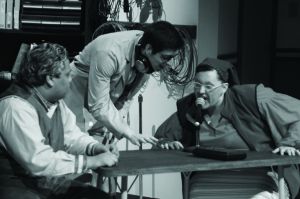‘The Language Archive’ hits Washburn’s stage
April 24, 2014
“The Language Archive” opened April 18 at Washburn’s Andrew J. and Georgia Neese Gray Theater in the Garvey Fine Arts Center and will run April 25 and 26 at 7:30 p.m. and close April 27 with a 2 p.m. matinee.
The lavish design of the set was a wonder to behold. Clearly delineated into three separate spaces, stage right contained the apartment of the two main characters. Center stage was devoted to the language lab, with stage left housing the home of the language teacher.
The end spaces were later converted to a bakery stage right, a hospital room and subsequently a moving train stage left. The set was masterfully constructed and the experience and love of the art by the builder was apparent in every detail.
Elaborate trim accented with a pleasing color pallate and attention to detail audiences are rarely treated to in this era of minimalist staging delighted the eye and helped draw the audience into the plot. So perfect in design, even the floor seemed to be made of real hardwood.
The use of space was so masterful that not an inch of it was wasted as it came right up to the audience with the placement of a rail depot area where the painted floor invoked the feel of the rails. So realistic was the portrayal of the train that when it passed, it caused the audience to shrink back as if there was a real threat to safety.
Although the title implies the plot is about language, the central theme is love. The love of a husband and wife, the love of language and unrequited love all converge in this brilliant work that caused the mind to consider one’s own place in the spectrum of love.
The narrator, Ashley Vaughan, made an appearance at the beginning and helped the audience settle in to get centered. Her voice became the guiding force from offstage as the action unfolded.
As the play begins, Mary, played by Natalie Shinn and George, played by Corey Perkins, are spending a typical evening at home. We quickly find that their marriage is in trouble, yet George, although concerned about Mary’s behavior, is so engrossed in his academia that he fails to understand what her issue is. The costumes are reminiscent of the 1950s, yet possess a modern quality that made the time line ambiguous.
In the lab, we are introduced to George’s love struck assistant Emma, played by Jamie Schartz. We learn that George’s purpose in life is to record dying languages in an attempt to save them from complete extinction. An old couple comes in to oblige by allowing him to record them conversing in their native language.
They are the last two speakers of this language and George is over the moon that he has this opportunity. The actors create an excitement and desire so palpable that it is impossible not to get swept up in the desire to hear the language.
Alta, played by Heather Ives and Resten, played by Isaac Medina quickly steal the spot light as their characters engage in arguing in English, not their dying language. Their dynamic is believable, engaging and humorous. It is completely entertaining and engrossing to follow their saga.
This is one of the best subplots of the show as it digs deep into the soul and strikes every emotional chord it can find in the human spirit. Their performances are a delight as they become their characters and share them with the audience.
We see the extent to which Emma is in love with George when she visits a language instructor, Marissa Meis, who also delivered a perfect performance as an elderly German teacher of Esperanto. Her accent is nearly flawless, and her delivery spot on as she brings out the character’s layers. As Emma desperately tries to learn this language of equality that George so dearly loves, the audience is treated to laughter and advice for the lovelorn.
L.L. Zamenhof, played by Nicholas Washburn, invented the language Esperanto in an attempt to unify the town of Bialystok, Russia. This historical figure takes a key position in the play’s second act and becomes one of the most important plot devices the playwright employs.
Despite the brevity of time on the stage, his performance is pristine and extremely important in motivating Emma, as well as for the denouement where he imparts wisdom for the ages that the audience will integrate into their own lives.
Also worthy of mention is Alex Vaughn, who forces to the audience to think about the nature of life and whether or not it is worth living as he grapples with the weight of his responsibility as a baker in an early scene with Mary. Additionally, he helps move the plot forward as a passerby.
His performance adds a new dynamic to the play and his portrayal of the baker evokes sympathy and empathy, which adds to the complex emotional soup the production cooks up.
Overall, the brilliance of set design, lighting and direction and acting came together in a symphonic convergence of perfection to deliver one of the most memorable and emotionally charged performances this reviewer has ever had the pleasure to witness.
Kudos to the cast and crew on a job well done. The experience of this performance will have a lasting and perhaps life changing impact on anyone lucky enough to attend.



